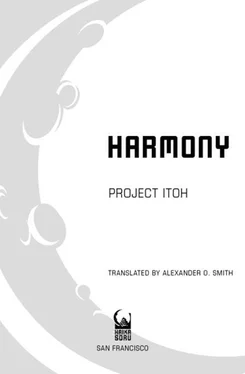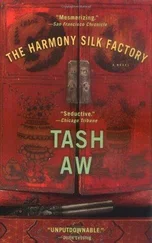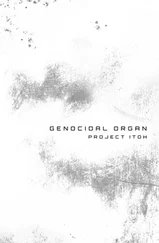Itoh, Project - Harmony
Здесь есть возможность читать онлайн «Itoh, Project - Harmony» весь текст электронной книги совершенно бесплатно (целиком полную версию без сокращений). В некоторых случаях можно слушать аудио, скачать через торрент в формате fb2 и присутствует краткое содержание. Год выпуска: 2010, Издательство: Haikasoru/VIZ Media, Жанр: Старинная литература, на английском языке. Описание произведения, (предисловие) а так же отзывы посетителей доступны на портале библиотеки ЛибКат.
- Название:Harmony
- Автор:
- Издательство:Haikasoru/VIZ Media
- Жанр:
- Год:2010
- ISBN:нет данных
- Рейтинг книги:4.33 / 5. Голосов: 3
-
Избранное:Добавить в избранное
- Отзывы:
-
Ваша оценка:
- 80
- 1
- 2
- 3
- 4
- 5
Harmony: краткое содержание, описание и аннотация
Предлагаем к чтению аннотацию, описание, краткое содержание или предисловие (зависит от того, что написал сам автор книги «Harmony»). Если вы не нашли необходимую информацию о книге — напишите в комментариях, мы постараемся отыскать её.
Harmony — читать онлайн бесплатно полную книгу (весь текст) целиком
Ниже представлен текст книги, разбитый по страницам. Система сохранения места последней прочитанной страницы, позволяет с удобством читать онлайн бесплатно книгу «Harmony», без необходимости каждый раз заново искать на чём Вы остановились. Поставьте закладку, и сможете в любой момент перейти на страницу, на которой закончили чтение.
Интервал:
Закладка:
I took an automag from the hotel. I didn’t care to experience the horror of the subway again, nor did I feel like going back to my own home. I was here to visit Miach Mihie’s parents.
I’m sorry, Miach.
I couldn’t exactly go to the police or Prime Inspector Os Cara Stauffenberg and tell them that the trigger for 6,582 people across the world taking their lives had been those words—words important only to myself, Cian, and Miach. They wouldn’t believe me.In fact, they’d probably recommend me for immediate therapy.
I wasn’t sure I would be able to explain why I was going to find Miach’s parents. Certainly not because one of 6,582 people had mentioned her name before committing suicide.
Truth be told, I didn’t really believe me either. I had come here on the strength of a clue you could barely call a clue, a gut feeling that was hardly reliable enough to call a gut feeling, and an emotion that was something like fear—fear of the ghost of Miach Mihie. In a world where everything was public property, my reason was so private it was almost lewd.
Through the lens of AR, everyone in the world wore their
on their sleeve. Focus for any amount of time on someone you saw in the street, and a box of data would appear by their head, telling you everything you could possibly want to know about them. In lifeist society, where it was considered a moral obligation to reveal personal information, especially that concerning one’s health, the very word private had the illicit stench of secrecy to it.
≡
So it was that I found myself on a solo investigation, using the authority granted me by the Geneva Convention as a Helix agent to the fullest extent. Miach Mihie’s parents had moved several months after their daughter died, but it did not take me long to track down their new residence.
The neighborhood was one of those admedistration collectives with security cameras monitoring all passersby. At the entrance to the zone, you had to switch from whatever mode of transport you had used to get there to a collective-provided magcar. I stepped out of the car and walked up to the front door of the house, then pressed my index finger to the fingerplate.
“Hey, Tuan, did you know that people used to hit doors with their hands?”
Miach’s voice in my memory.
“There used to be no way to tell who was standing outside your door at all. Some people installed little fisheye lenses on their doors, but that was about the limit of the technology. Not that being in the dark about the people around you was any big deal back then—there weren’t ubiquitous personal information displays all the time half a century ago. These days, you just touch the plate on the door and all your info is posted to the AR of the person inside on their wall or something, but they didn’t have any way of doing that before.”
“So they just hit the door? That’s so, I don’t know, primitive ,” Cian said.
“It was the easiest way to announce their presence to whoever was inside. They called it ‘knocking.’ You used your knuckles, like this.” Miach demonstrated on the classroom wall. “When a person inside heard the knocking, they would shout out ‘Who is it?’ and the person on the outside would shout back ‘It’s so-and-so from such-and-such.’ And the person inside just had to take them at their word. So, if you think about it, every time you opened your door, you were taking a little risk.”
Cian and I nodded enthusiastically, starry-eyed at the seemingly limitless font of knowledge that was Miach Mihie.
“But you got to think people are getting tired of this telling-everyone-who-they-are-all-the-time business. What a drag it is to have to show you’re healthy and you’re taking care of yourself all the time. We’re tired of it, right? People shouldn’t have to walk around with labels over their heads, proving every minute and every second exactly who they are to the world.”
“Say, Tuan—”
Another memory.
“You know privacy didn’t used to be such a naughty word.”
I shook my head, eyes flitting around the room. I couldn’t believe she had just said that word here in class, in the middle of the day.
Not that Miach ever cared who heard her proclamations.
“It was because,” she continued, oblivious, “information about yourself used to be available only to yourself and a few others. That’s what privacy meant. But now, everything that used to be private is public, so the only thing ‘private’ these days is sex. Now, why do you think that happened, Cian?”
Cian shrugged her shoulders.
For some reason, a light went off in my head at that moment. “It’s like we’ve offered ourselves to the rest of the world as hostages to guarantee our own good behavior,” I said eagerly.
Miach smiled. “That’s right, Tuan, it’s just like that.”
I remember feeling a little elation at having said something to please her.
“It’s just like Tuan says. By letting everyone else know every little detail about ourselves, we’re making sure we can’t get away with anything. Give up your erratic free will as a hostage to everyone else in society and you’re guaranteed to keep things safe and peaceful.”
This was how Miach dispensed wisdom, little by little, to us little girls in the corner of a classroom, explaining to us exactly why we were so frustrated and why we felt like we didn’t belong.
Thinking back on it now, I’m amazed it never occurred to me at the time to wonder what sort of people Miach’s parents were. I had never met them, and I didn’t remember Miach ever talking about them.
Eventually, I had told Miach who my dad was, that he had written the thesis that led to WatchMe, that he had contributed significantly to the world we despised.
All Miach had said was “huh.”
She hadn’t lost it. She hadn’t hated me. She had hardly reacted at all.
Now I found I really was curious what kind of parents it took to raise a girl who could smile while she daydreamed out loud about using a household medcare unit to kill fifty thousand people. I removed my finger from the plate and waited quietly for an answer.
“Might I ask what sort of business a member of an international organization has with us?” the door said, breaking the silence and snapping me out of my reverie fully back into the present.
“I’m with the Helix Inspection Agency—I suppose you saw that from my ID. We’re an investigative branch of WHO. I was hoping I could talk to you for a moment concerning the multiple suicides in the Sukunabikona Conclave yesterday.”
The door opened and a woman emerged. She looked to be in her late fifties. It was Reiko Mihie, Miach’s mother.
Her face held none of Miach’s twisted willfulness, that “dark illumination” for lack of a better term—none of her eccentric vitality. Instead, her face was like that of every other admedistration member, like the people I had seen on the subway upon my return to Japan. They were healthy but lifeless, if that made any sense. Compared to the Kel Tamasheq whose bodies, wrapped in indigo, practically shimmered with a vitality that sprang from their deep history, the people living in this country were like walking corpses.
That’s progress, said the Miach Mihie living inside me.The more advanced a people became, the closer they grew to death.
“Of course I’m happy to help in any way that I can. I’m just not sure what that would be.”
“I wanted to ask you about your daughter, Miach.”
A cloud passed over Reiko’s face. I saw confusion in her eyes.
“My daughter has been gone—dead—for more than ten years now. I’m sorry, but I don’t see the connection.”
“Yes, I’m aware of this,” I said, marveling that this woman didn’t appear to remember her daughter’s friend, or that I had taken an oath to kill myself with her. That I had been one of three foolish little girls.
Читать дальшеИнтервал:
Закладка:
Похожие книги на «Harmony»
Представляем Вашему вниманию похожие книги на «Harmony» списком для выбора. Мы отобрали схожую по названию и смыслу литературу в надежде предоставить читателям больше вариантов отыскать новые, интересные, ещё непрочитанные произведения.
Обсуждение, отзывы о книге «Harmony» и просто собственные мнения читателей. Оставьте ваши комментарии, напишите, что Вы думаете о произведении, его смысле или главных героях. Укажите что конкретно понравилось, а что нет, и почему Вы так считаете.












